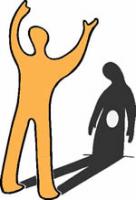Low Self-Esteem — Not Worth Much As A Diagnosis
Query: Why won’t Santa’s elves work now that Santa has lowered wages and they have hastened the assembly line and there are no cookie breaks?
Answer: They all have low elf-esteem.
No I don’t know the origin of the above joke. I don’t even know about low elf-esteem, as Santa must be referring his (psychologically) non-functional elves to someone that takes his insurance.
 I do know that the knowledge of “low self-esteem” as a problem has entered the language and the culture with an enthusiasm and vengeance reserved only for high-frequency psychobabble which has been divorced so completely from its academically-derived meaning that it was possible for me not long ago, when walking dangerously close to a Starbucks, to overhear two people saying it was the cause of their woes.
I do know that the knowledge of “low self-esteem” as a problem has entered the language and the culture with an enthusiasm and vengeance reserved only for high-frequency psychobabble which has been divorced so completely from its academically-derived meaning that it was possible for me not long ago, when walking dangerously close to a Starbucks, to overhear two people saying it was the cause of their woes.
Our friends at Wikipedia define it as a term used by psychologists, an enduring aspect of personality encompassing beliefs, emotions and behavior.
Now some of the best (clinical) psychologists I know seem to help people by being intuitive and only use this kind of theory in retrofit, when they need to make an assessment and communicate it to someone else, like a colleague or insurance company.
Of the many people who talk about psychology on the web, at least this web site is willing to admit it is a popular word, engrained in our culture.
If it is indeed something enduring in personality, then we ought to build this “global sense of self-worth” in children.
And then, we can take it one more step, and see if we have enough, and work on building it. We start by testing:
I scored a hundred because I think I am pretty hot stuff. The living proof is that I sit around writing stuff like this.
You can learn to foster self-esteem in a child. But the descriptions of how to do so are pretty abstract, and may actually be hard to apply in reality.
Luckily, there are folks who want to help us all. And their ideas are fine.
Self-esteem has come long way from the time the word was first used. I think it was the psychologist Nathaniel Branden who first defined and used the concept and wrote lovely books about it. I think that all of this happened about the time when he was having an affair with the much older and very-married Ayn Rand, mentor of his professional group. He scored with is idol — I have no doubt that did wonders for his self-esteem.
It does not matter exactly how this aspect of self-concept, how this evaluation of one’s own lovability entered not only the professional elite psychology realm, but also the jargon of Starbucks. What matters is not what it is, but how come nobody has any. You hear me — nobody. Like the 40-year-old professional woman who entered my office giving me “low self-esteem” as her chief complaint in life (which was really depression but she had no other words). Or a young woman at Starbucks talking to her friend whom I shall never meet again. Or one of our past cleaning ladies, who declined my offer to discuss the matter (even for free).
“I have low self-esteem” has been the new, “clean,” and pseudoeducated equivalent of “I feel like $#!%.” It helps those who use it in several ways.
Someone who says they have low self-esteem is also saying, “I feel like I am not important.” “I feel like other people are better off than I am” “I got this rotten life by the luck of the draw” Or the one that people mean most often when they are coming to see me: “I feel rotten, this is not my fault, and I don’t need any stinking medication.”
The last one is usually accurate.
Why is there this epidemic of people feeling they simply are not “worth” much? It has always been there, if not as an epidemic. The reason is simple. There are plenty of people around who have a vested interest in making a person feel they are not “worth” much.
If you can get someone to hang their sense of self on you, then you have them controlled for life. The first examples that come to mind are several of my patients that have “mother” fixations as they will never please mother and are always trying to do so.
My usual strategy in therapy has something to do with engineering a “disconnect” here. I teach people (who are generally women) that they can decide whether or not they want whatever mom says to make them feel rotten. This one is far easier said than done. But the simple truth is that when a mother puts her stock in mothering skills, she is a dominant personality with a “child,” adult or not, who is dependent on her. The child is emotionally dependent long after he or she is financially dependent.
We end up with a child who is often depressed, with low “self esteem,” because the emotional satisfaction, especially from a truly sick mother who has an abnormal personality (like a little bit of narcissistic or borderline traits). Now if everybody got “low self-esteem” from their mothers, we could throw them all into any reasonable modality of therapy and this condition could disappear from the face of the earth. Such is not the case.
Low self-esteem is the epidemic of our society. Mostly anybody I would meet and comment to in the elevator or a parking lot. Yes, I do this. It has started to annoy my husband enough that he tries to use elbow-control; or, in extreme situations, he has started putting me on “Stifle,” the same way Archie Bunker did Edith.
 People have very low self esteem. It is a pandemic. Everybody feels insufficient. They are not smart enough or fast enough or in any way capable enough. They are lonely and alienated and struggling at surviving worse than a dinosaur in the ice age. NOBODY feels that life is a skill they have mastered, except for maybe the manic or the psychotic or maybe the narcissistic. The advice for how to feel good about yourself is mostly thin and difficult to enforce.
People have very low self esteem. It is a pandemic. Everybody feels insufficient. They are not smart enough or fast enough or in any way capable enough. They are lonely and alienated and struggling at surviving worse than a dinosaur in the ice age. NOBODY feels that life is a skill they have mastered, except for maybe the manic or the psychotic or maybe the narcissistic. The advice for how to feel good about yourself is mostly thin and difficult to enforce.
Where is all this coming from?
By sheer arithmetic it could only be coming from something that aims at the masses. I think that our cult of advertisements that generate money by encouraging consumption is at the heart of this.
Even someone as obviously healthy as me has a searing memory of FIRST feeling fat when I saw a television commercial, “fun comes first to the slender ones.” I am lucky, really lucky, that I had a mother who explained that one to me as the call to advertising consumption that it was.
People whose houses were not clean enough, or were not smart enough, or whose children would not be successful enough. If there were no other kinds of messages coming at us, those incredibly effective messages would be enough to put everybody’s self-esteem somewhere between the toilet and the deepest mantle of the earth’s crust. But wait, there’s more.
I believe our teachers and our in-the-place of parents type authorities are constantly reinforcing our remaining in fear. “Respect” is too often fear. We have too many things in our lives which we have to do “or-else;” too many “Thou shalt not”s for anybody to have any kind of durable self-esteem.
Let’s face it. Nobody out there has any interest in us being autonomous, sure of ourselves, or even knowing, really knowing, how to build a better republic. It is a LOT easier for us to hear, for example, a bipartisan polemic, believe every word we are being told, believe everyone who is on the “OPPOSING” side is useless, and to carry on.
It is like the way someone who has just bought a Ford reads Ford ads and someone who has just bought a Chevy reads Chevy ads. We have been taught to trust our elected officials. Even though all men (the archaic word for “people”) are created equal, we go through school as children and politics as adults acting as we have been trained to act, consistently manipulated for some sort of controllability.
At least in politics, these ideas and mechanisms were born in an age where technology made the rules. We had to trust our representatives to get things done in any kind of a timely manner. Now, it would be very possible to have direct election of a president over the internet. Instead, I think we are all being controlled, and it is mostly by our low self esteem.
Not the next election, nor the next job promotion, nor the next tube of toothpaste or lipstick, nor any single thing we are taught to buy or do or have, can make us feel better about ourselves. The only payoff we have from raising our self-esteem, which I can only convince comes from inference and example, is to feel good about raising our self esteem, is healthier individuals and healthy relationships. We have to value that. We have to value it enough to fight off those who are profiting from our lowered self-esteem and the corollary dependency. Those interests who profit from our low self-esteem are those interests who control our world.
The courage to change is great. The payoff is immeasurable.
Filed under Personality Disorders by on Dec 23rd, 2009. ![]()
Leave a Comment